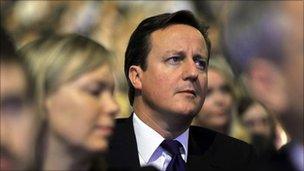Tory conference: Is Cameron calling for low growth?
- Published
- comments

The PM was in the audience for Chancellor George Osborne's conference speech
In calling for consumers to cut their big debts, should David Cameron be careful what he wishes for?
With even the UK's biggest and most fearsome retailer, Tesco, reporting lacklustre performance in Britain today, many consumer-facing businesses won't thank him for urging thrift on the nation.
That said, those without vested interests would argue Mr Cameron is right to be anxious that the indebtedness of UK households remains at near-record levels, equivalent in aggregate to around 160% of disposable incomes.
By all historic standards, that level of indebtedness is high, although the debt/income ratio is down from the absolute record of 180% hit in 2008.
So many would argue that there can't be a sustainable long-term recovery in the British economy until, to quote Mr Cameron, British consumers get "their books in order".
But the British economy is disproportionately dependent on consumer spending: it represents not far off two-thirds of British GDP.
Here's the thing: when the Office for Budget Responsibility forecast in March that GDP growth would return to 2.5% in 2012 and would then rise to almost 3% in the three subsequent years, that was predicated on a revival in consumer spending that would see British households take on a staggering £570bn of additional debts by 2015 - which would lift the ratio of household debts to disposable income back up to 175%.
Mr Cameron is today publicly announcing that he doesn't want UK households to borrow more in that way.
He thinks they should repay what they already owe. But if they do that, they won't be spending any more in Tesco, Marks & Spencer, on the internet or in corner shops.
Long road
That may well be perfectly sensible - in that perhaps the only way to put the UK economy on a sustainable footing is for it to be reconstructed, or rebalanced (in the jargon), so that it's less reliant on debt-funded consumer spending and is powered instead by exports of goods and services.
But that kind of economic reconfiguration can't happen overnight.
Remember that manufacturers, for example, represent just 12% of the economy.
So if households do what Mr Cameron wants, and continue to pay back their debts, it is very difficult to see how the economy can grow at much more than 1% or so per year for many years to come.
Mr Cameron's thrifty economy would be a low-growth economy for many years to come - as the significant price of ultimately putting the economy on stronger foundations.